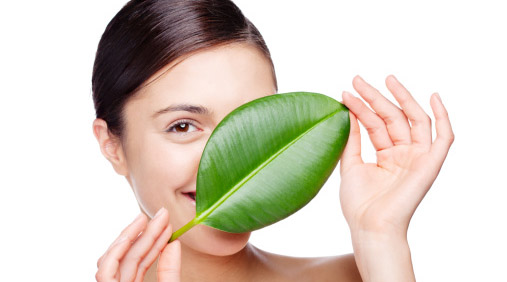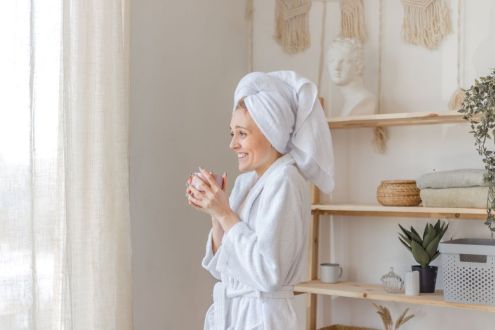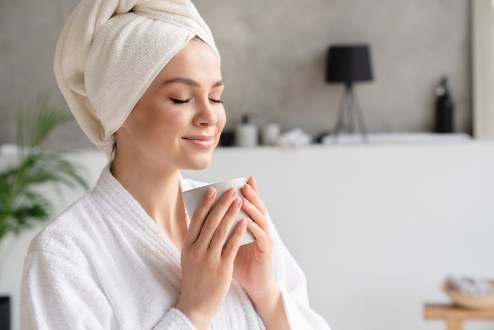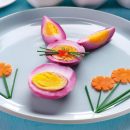How to be a Natural Beauty
A green guide to detoxing your skincare regime

In our April issue Natural Beauty Bible author Jo Fairley stresses the importance of being a ‘label queen’. She doesn’t mean hitting Harrods to stock up on the latest designer arm candy and high-heeled shoes. Instead, she talks about the importance of scrutinising the list of ingredients in our beauty products. Sifting through label jargon helps us to understand what’s really lurking in our lotions and potions so you don’t have to question how natural they really are. Being a label queen is the first step to natural beauty, here are the rest…
Less is more – Be kinder to the planet by cutting down on the number of products and packaging you use. This can be done by swapping throwaway facial wipes for a cleanser and muslin flannel like Liz Earle Hot Cloth Cleanser, £14.75, and investing in natural multi-purpose products like Dr Lipp’s Original Nipple Balm, £11.50, and Manuka Doctor Repairing Skin Cream, £19.99, that can be used on both face and body. Switching your daily essentials for more environmentally friendly products doesn’t have to be a painful experience. Amazon Series, £12.99, containing a plentiful blend of revitalising herbs and plants, diminishes the demand for supplementary treatment oils or serums. Your locks and your bank balanced will thank you for it.
Zoom in – The UK has seen a 170 per cent increase in new organic and natural beauty product launches, yet not all green products are as planet-friendly as their labels suggest. Doing your research is vital as currently there is no legal definition of natural or organic so ‘look out for labels such as Soil Association, USDA, COSMOS, BDIH, Natrue, ECOCERT Natural & Organic as these guarantee a percentage of 90-100% natural ingredients,’ says Nature & Co founder Edwige Aboudaram. ‘If you’re still unsure check the list of ingredients. Any natural products should not contain any parabens, sodium lauryl sulfate or petrochemicals such as propylene glycol; mineral oil and petroleum derived ingredients.’
Farmer friendly – Intensive farming is renowned for its devastating environmental impact on our landscape. In order to reduce further damage buying organically grown products is key. ‘Choosing skin care that has been created with ethical ingredients is a great way for consumers to make a difference and help the traditional farming industry,’ says Elijah Choo, founder of Bodhi Skincare – which uses organic argan oil, which has a direct positive impact on the ecology of Morocco, the Berber community and their traditional farming methods.
Food for thought – Natural beauty is not just about what you put on your body but what you put in it. Our food choices have an enormous impact on our appearance and can bring shine back to locks, strengthen nails and make skin glow. Organic fruit and vegetables can be powerful beauty tools but don’t come cheap – so why not grow your own. The Soil Association estimates that there are 300,000 acres of prime growing land in domestic gardens in the UK and 80 per cent of households have access to a garden. Even urban dwellers can get in on the act but using window boxes or plant pots. Cultivating your own food allows harvesting to happen almost immediately and as a result fewer nutrients are lost, allowing your body to reap the benefits of beauty-inducing minerals and vitamins. Moreover, the power of planting means that food miles are non-existent and by managing your garden using organic principles you can encourage bio-diversity, helping to improve your local environment.
Cruelty free – Being kind to the planet goes hand in hand with looking after the animals that inhabit it. There is no uniformity or regulation regarding animal testing claims on labels and many brands that claim to be against it sell their products in China, where animal testing is mandatory on all cosmetics. Thankfully there are a good handful of brands that have stayed true to their word, Lush Cosmetics in particular have paved the way for cruelty-free beauty and its campaigns have been applauded by animal rights groups all over the world. If you’re unsure about a brand’s stance on the matter, you can investigate via the Leaping Bunny Organisation. It lists all cosmetic companies that don’t test on animals or that don't buy into newly developed ingredients that necessitate further animal testing.








